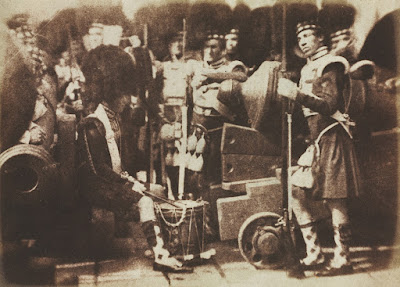 |
| Nevil Story-Maskelyne Chicken Feathers 1840 salted paper print Metropolitan Museum of Art, New York |
"[William Henry Fox] Talbot's first successes were made by placing a pressed botanical specimen directly on a piece of photosensitized paper, covering it with a sheet of glass, and setting it in the sun. Wherever the light struck, the paper darkened; wherever the plant blocked the light it remained white. He called his new discovery "the art of photogenic drawing." Nevil Story-Maskelyne, a teenager home from school during the summer of 1840, saw a demonstration of Talbot's process and tried his hand at the new art. This arrangement of chicken feathers is among his earliest pieces, and, as with Talbot's botanicals, the medium's capacity to record the soft texture of down, the detail of individual barbs, and the barred pattern of the feathers must have seemed an astonishing rendering of natural forms."
– curator's notes from the Metropolitan Museum
from The Boboli Gardens
 |
| Hippolyte Bayard Three Feathers ca. 1840-41 cyanotype Getty Museum, Los Angeles |
 |
| Hippolyte Bayard In the Studio of Bayard ca. 1845 salted paper print Getty Museum, Los Angeles |
 |
| Hippolyte Bayard The Trellis 1847 modern gelatin silver print from original calotype negative Art Institute of Chicago |
 |
| Hippolyte Bayard Self Portrait in the Garden ca. 1845-49 salted paper print Getty Museum, Los Angeles |
 |
| David Octavius Hill and Robert Adamson Group including David Octavius Hill in Medieval Costumes ca. 1843-47 calotype print Princeton University Art Museum |
 |
| David Octavius Hill and Robert Adamson Dr George Bell, Lady Alexina Moncrieff, and the Reverend Thomas Bell ca. 1843-47 salted paper print Nelson-Atkins Museum of Art, Kansas City, Missouri |
 |
| David Octavius Hill and Robert Adamson Portrait: the Gown and the Casket ca. 1845 carbon print Minneapolis Institute of Art |
 |
| David Octavius Hill and Robert Adamson Scots Guards at Edinburgh Castle 1846 salted paper print Cleveland Museum of Art |
 |
| John Adams Whipple Portrait of a Young Woman ca. 1846 daguerreotype Nelson-Atkins Museum of Art, Kansas City, Missouri |
 |
| Van Loan & Mayall Husband and Wife ca. 1845-46 daguerreotype Nelson-Atkins Museum of Art, Kansas City, Missouri |
 |
| Louis-Adolphe Humbert de Molard Portrait of Henriette Reneé Patu ca. 1845 waxed salted paper print Metropolitan Museum of Art, New York |
 |
| Louis-Adolphe Humbert de Molard Woman wearing Local Costume, Lisieux, Argentelle 1846 daguerreotype Nelson-Atkins Museum of Art, Kansas City, Missouri |
 |
| Maxime Du Camp Colonnade - Temple of the Sun Baalbek, Lebanon (originally Heliopolis) ca. 1849-50 salted paper print Art Institute of Chicago |
 |
| Antoine Claudet Multiple Exposures of the Moon ca. 1846-50 daguerreotype Metropolitan Museum of Art, New York |
 |
| Anonymous Photographer Mountain Maple ca. 1845-50 cyanotype and plant specimen Princeton University Art Museum |
from The Boboli Gardens
Fixed to the gates, two rams of Capricorn
Lower and butt their heads above the stairs,
Chiselled because a Cosimo was born
When winter stars were frozen in mid-air.
Two rows of sculpted hedges form a hall
Leading to a font and marble man. Shadows
Fall from the cheekbones of the statue, fall
Across a horn through which no music blows.
At his white feet, brash bronze monkeys curl
Their toes, and scratch, and twist their necks, and peer
Into pools where leaves like constellations twirl,
Blind to an image greater than their own,
Deaf to the silence, deaf to what you hear:
Behind the pool, a single wild place
With glittering bugs and weeds, the Uccellaia,
Where traps just out of sight of the palace
Were set for rabbits and birds in green July,
The grotto where now long-dead couples met,
And in their ears the final, rich, black chord
Of birds breaking their wings against the net
Reminded them that even love will hoard
Those notes, like kisses beneath the satin covers.
Three hundred years: the statues that waited there
Still stare into the trees, where your death hovers,
Blind to an image greater than their own,
Deaf to the silence of the hunted hare.
– Gjertrud Schnackenberg (1974)